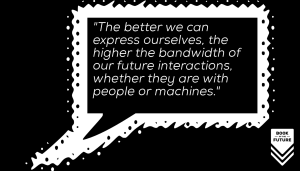Future language: precision matters

Life is (sadly) not like an Aaron Sorkin script. Whatever we may like to think about our own linguistic abilities, not many can spar with the wit and speed of his characters. Maybe Stephen Fry. But not most of us. We always think of the perfect retort three hours later.
Perhaps in the future we will be more Sorkin-esque. We certainly might wish we were. Because two things are happening that will raise the value of efficient, effective verbal communication.
Speaking machines
Firstly, our interface with machines is increasingly going to be based on natural language. We will talk and the machines will listen. And vice versa. The greater the speed, accuracy and range of our verbal communication, the higher the bandwidth of our interface to the machine.
This could take us in a number of directions. Witness the rise of txtspeak, a rich and highly efficient form of communication, even if it offends the eyes of the preceding generations. Or look at the syntax of really powerful web search terms, a mixture of human language and computer code. Constructing them well requires great skill.
I like to think that the depth of our long-evolved languages will prove superior to these hybrids, but future language will doubtless evolve in response to the new needs, as it always has.
The end of low-value interactions
The second thing that’s happening is that our low-value interactions are disappearing. For people like me who hate, and I mean HATE, administration, this is a huge bonus. Less and less will we need to fill out forms, interact with call centres, deal with post, or scan receipts. Because we will either allow institutions sufficient access to our personal data to let them find the answer. or we will have an AI assistant who handles these things for us.
There are serious issues with both these steps, around privacy, security and employment. How much do we want institutions to know about us — particularly states? How much are we willing to trade or risk in order to eliminate many of life’s major irritations? How many jobs will be lost as a result of the falling friction in our interactions — friction previously smoothed by human intervention?
Personally? I am concerned about just how much I might let go in order to never have to fill out a form again. For all my principles, I would give a lot for that.
Future language
As low value interactions diminish so the the importance of being skilled in high value interactions will grow, whether they are with machines or people. The better we can express ourselves, the higher the bandwidth of those interactions. I’m not saying every conversation is going to be like a Sorkin-script. But we might all start to place more emphasis on the quality of our repartee.
